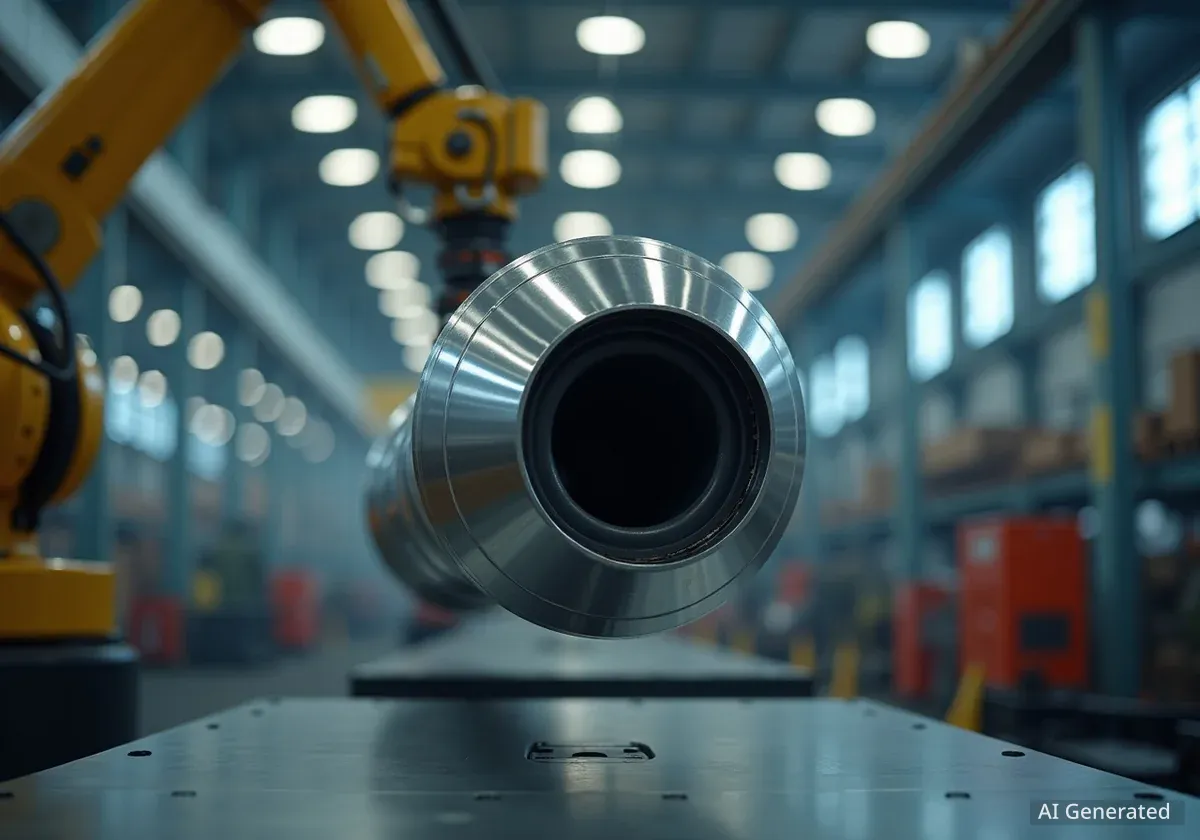The U.S. Department of Defense has awarded contracts totaling over $224 million to three companies in an effort to strengthen the nation's domestic production of solid rocket motors (SRMs). The initiative, announced on September 26, aims to address supply chain vulnerabilities and meet the rising global demand for these critical propulsion systems.
The contracts target key areas of the manufacturing process, from advanced propellant development to the production of essential components like rocket nozzles. This strategic investment underscores the Pentagon's focus on reinforcing the defense industrial base for missiles, hypersonic weapons, and space launch vehicles.
Key Takeaways
- The Pentagon has allocated more than $224.8 million across three separate contracts to enhance the U.S. solid rocket motor (SRM) supply chain.
- X-Bow Launch Systems received the largest award, a four-year, $191.3 million contract for advanced propellant manufacturing technology.
- An additional $33.5 million was awarded under the Defense Production Act (DPA) to Americarb and General Dynamics to expand production of critical nozzle components.
- Officials cite increased demand from global military operations and existing supply chain fragility as the primary drivers for these investments.
Addressing a Critical Industrial Base Gap
The Department of Defense has identified the solid rocket motor industrial base as a sector facing significant strain. Officials have pointed to a combination of supply chain fragility and a sharp increase in demand as major concerns for national security readiness.
Solid rocket motors are essential, self-contained propulsion units. They are a core component in a wide array of military systems, including tactical missiles used by ground forces, advanced hypersonic weapons, and the powerful boosters required for space launches. The ongoing military operations in Ukraine and the Middle East have significantly increased the consumption of munitions that rely on SRMs, placing further pressure on an already constrained production capacity.
What Are Solid Rocket Motors?
A solid rocket motor is a type of rocket engine that uses a solid propellant, which is a pre-mixed combination of fuel and oxidizer. Unlike liquid-propellant rockets, SRMs are simpler in design, can be stored for long periods, and provide high thrust almost instantly upon ignition. This makes them ideal for military applications like missiles and as initial-stage boosters for launch vehicles.
These new contracts represent a direct effort to mitigate these risks by expanding domestic manufacturing capabilities, diversifying the supplier base, and introducing innovative production techniques.
X-Bow Receives $191.3 Million for Advanced Manufacturing
The largest of the three awards is a four-year, $191.3 million contract granted to X-Bow Launch Systems, an aerospace company based in Albuquerque, New Mexico. The contract focuses on what the Pentagon terms “advanced integrated motor manufacturing.”
Awarded by the Air Force Test Center, this project requires X-Bow to design, build, and demonstrate a new capability for manufacturing advanced solid rocket motor propellant. The contract was issued following a competitive process that attracted numerous proposals from across the industry.
A New Player in Propulsion
Founded in 2016, X-Bow (pronounced “crossbow”) has positioned itself as an innovator in the SRM market, which has traditionally been dominated by established defense contractors like Northrop Grumman and L3Harris. The company utilizes proprietary 3D-printing and additive manufacturing techniques to produce both rocket motors and their propellant.
This approach is intended to accelerate production timelines and potentially reduce costs. X-Bow has been collaborating with the Air Force Research Laboratory for several years on these advanced manufacturing technologies. The company also has backing from strategic investors, including defense giant Lockheed Martin.
Defense Production Act Funds Bolster Component Supply Chain
In addition to the major award for X-Bow, the Pentagon announced two smaller but highly targeted contracts funded through the Defense Production Act (DPA). These awards, totaling $33.5 million, are aimed at expanding the production capacity for specific subcomponents essential for SRMs.
Defense Production Act (DPA)
The DPA is a federal law enacted in 1950 that grants the U.S. president the authority to expedite and expand the supply of materials and services from the U.S. industrial base to promote national defense. It is often used to address critical shortfalls in essential defense-related manufacturing.
The two DPA Title III awards address bottlenecks in the production of rocket nozzles, a part of the motor that directs the high-velocity exhaust gases.
- Americarb: This company received $12.6 million to develop a specialized material used for insulating rocket nozzles, protecting them from the extreme heat and pressure during operation.
- General Dynamics Ordnance and Tactical Systems: An award of $20.9 million was given to this established defense contractor to expand its nozzle production lines. The funding is also intended to help the company become a new domestic supplier of composite rocket nozzles and insulators.
Strengthening National Security Through Industrial Capacity
Pentagon officials emphasized that these investments are crucial for future military preparedness. The contracts are designed not only to increase the quantity of SRMs produced but also to build a more resilient and scalable supply chain.
“To meet the evolving threats of tomorrow, we must expand our capacity to produce the critical subcomponents that underpin our munitions systems,” said Undersecretary of Defense for Acquisition and Sustainment Michael Duffey. “By advancing resiliency in the solid rocket motor supply chain, we’re not only strengthening our defense industrial base but also helping to ensure a reliable and scalable supply of the materials and components crucial to our national security.”
By investing in both an emerging company like X-Bow and established suppliers like General Dynamics, the Department of Defense is pursuing a multi-faceted strategy. This includes fostering innovation through new manufacturing technologies while simultaneously shoring up the production of proven, legacy components.
The successful execution of these contracts is expected to create a more robust industrial base capable of responding to both current military needs and the demands of future defense programs, ensuring a stable supply of critical propulsion technology for years to come.





